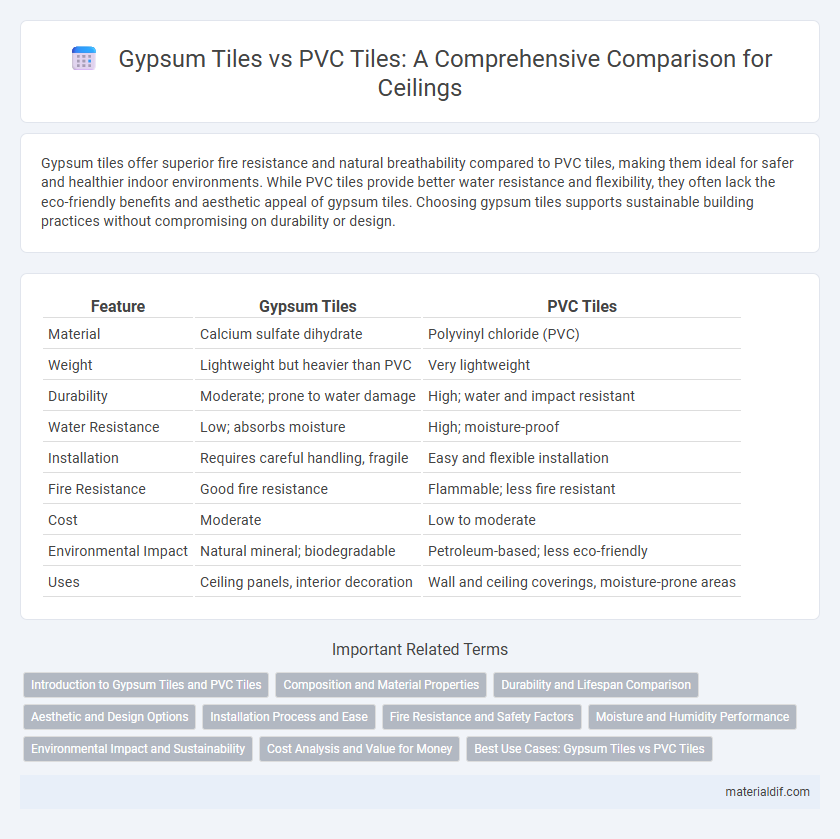Gypsum tiles offer superior fire resistance and natural breathability compared to PVC tiles, making them ideal for safer and healthier indoor environments. While PVC tiles provide better water resistance and flexibility, they often lack the eco-friendly benefits and aesthetic appeal of gypsum tiles. Choosing gypsum tiles supports sustainable building practices without compromising on durability or design.
Table of Comparison
| Feature | Gypsum Tiles | PVC Tiles |
|---|---|---|
| Material | Calcium sulfate dihydrate | Polyvinyl chloride (PVC) |
| Weight | Lightweight but heavier than PVC | Very lightweight |
| Durability | Moderate; prone to water damage | High; water and impact resistant |
| Water Resistance | Low; absorbs moisture | High; moisture-proof |
| Installation | Requires careful handling, fragile | Easy and flexible installation |
| Fire Resistance | Good fire resistance | Flammable; less fire resistant |
| Cost | Moderate | Low to moderate |
| Environmental Impact | Natural mineral; biodegradable | Petroleum-based; less eco-friendly |
| Uses | Ceiling panels, interior decoration | Wall and ceiling coverings, moisture-prone areas |
Introduction to Gypsum Tiles and PVC Tiles
Gypsum tiles are made from natural gypsum, offering fire resistance, moisture regulation, and eco-friendly benefits, making them ideal for interior wall and ceiling applications. PVC tiles, composed of polyvinyl chloride, provide high durability, water resistance, and easy maintenance, commonly used in commercial and wet areas. Both materials vary significantly in composition, performance, and installation methods, influencing their suitability for specific building environments.
Composition and Material Properties
Gypsum tiles are composed primarily of calcium sulfate dihydrate, providing excellent fire resistance and sound insulation, while PVC tiles are made from polyvinyl chloride, offering superior water resistance and flexibility. The mineral-based structure of gypsum tiles ensures breathability and natural moisture regulation, contrasted with the synthetic, non-porous nature of PVC tiles that can trap heat. Gypsum's eco-friendly, biodegradable composition contrasts with the durable, chemical-based makeup of PVC, influencing both environmental impact and indoor air quality.
Durability and Lifespan Comparison
Gypsum tiles offer moderate durability with a typical lifespan of 7 to 10 years, making them suitable for low to medium-traffic areas due to their resistance to fire and moisture but vulnerability to heavy impact. PVC tiles outperform gypsum in durability, boasting a lifespan often exceeding 15 years thanks to their robust, water-resistant, and flexible composition that withstands heavy foot traffic and wear. Choosing between gypsum and PVC tiles depends on the specific environmental conditions and desired longevity, with PVC tiles proving more resilient in high-moisture and high-impact settings.
Aesthetic and Design Options
Gypsum tiles offer a smooth, matte finish with intricate moldings and patterns that provide a sophisticated, elegant aesthetic ideal for classical and contemporary interiors. PVC tiles deliver a versatile range of vibrant colors and textures, including wood and stone effects, suitable for creative, modern designs requiring lightweight and moisture-resistant materials. Gypsum's ability to be easily painted enhances customization, while PVC's flexibility allows for quick installation and maintenance in diverse environments.
Installation Process and Ease
Gypsum tiles offer straightforward installation with lightweight panels that can be easily cut and fixed using standard tools, reducing labor time compared to PVC tiles. PVC tiles require adhesive application and careful alignment to prevent gaps or bubbles, often necessitating professional installation for optimal results. The ease of handling and modifying gypsum tiles makes them a preferred choice for fast, hassle-free ceiling and wall installations.
Fire Resistance and Safety Factors
Gypsum tiles exhibit superior fire resistance compared to PVC tiles, as gypsum contains chemically bound water that slows heat transfer and inhibits flame spread. PVC tiles are combustible and can release toxic fumes when burned, posing significant safety risks. Choosing gypsum tiles enhances building fire safety and complies with stringent fire safety standards.
Moisture and Humidity Performance
Gypsum tiles are highly susceptible to moisture and humidity, often leading to swelling, warping, and deterioration in damp environments. PVC tiles, composed of polyvinyl chloride, offer superior resistance to moisture, making them ideal for bathrooms, kitchens, and basements where humidity levels are elevated. The water-resistant properties of PVC tiles ensure long-lasting durability and minimal maintenance compared to gypsum tiles in humid conditions.
Environmental Impact and Sustainability
Gypsum tiles offer superior environmental benefits compared to PVC tiles due to their natural composition and biodegradability, reducing landfill waste and chemical pollution. The production of gypsum tiles involves less energy consumption and emits fewer greenhouse gases, enhancing sustainability in building materials. In contrast, PVC tiles are derived from non-renewable petroleum, release toxic chemicals during manufacturing and disposal, and present significant challenges for recycling and environmental health.
Cost Analysis and Value for Money
Gypsum tiles generally offer better cost-efficiency due to their lower material expense and ease of installation compared to PVC tiles, which tend to be pricier upfront but provide enhanced durability and water resistance. While PVC tiles have a higher initial investment, their longevity and low maintenance requirements often result in better long-term value for money. Conversely, gypsum tiles are ideal for budget-conscious projects where aesthetic finish and quick installation are prioritized over extended lifespan.
Best Use Cases: Gypsum Tiles vs PVC Tiles
Gypsum tiles excel in indoor applications requiring fire resistance, sound insulation, and eco-friendliness, making them ideal for residential and commercial ceilings. PVC tiles are best suited for areas exposed to moisture, such as bathrooms and kitchens, due to their water resistance and easy maintenance. Choosing between gypsum and PVC tiles depends on specific needs like durability, environmental conditions, and acoustic performance.
Gypsum tiles vs PVC tiles Infographic

 materialdif.com
materialdif.com